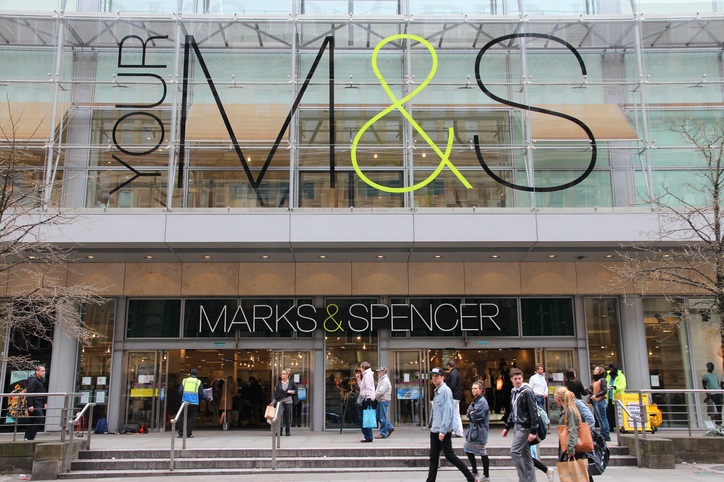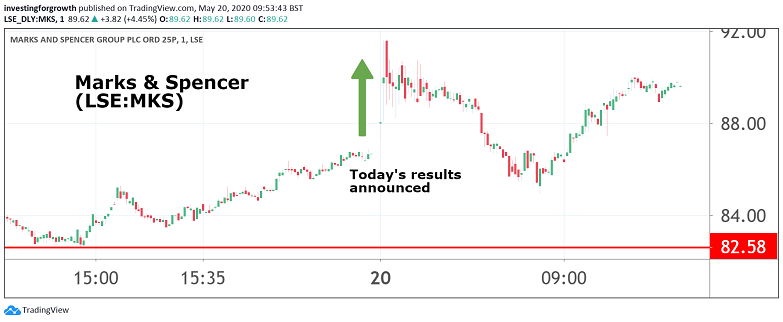M&S: why pandemic may finally kickstart a true turnaround
After years of failure, it has taken a disaster to trigger vital changes, writes our head of markets.
20th May 2020 10:04
by Richard Hunter from interactive investor
After years of failure, it has taken a disaster to trigger vital changes, writes our head of markets.

The Covid-19 crisis may unwittingly have provided Marks & Spencer (LSE:MKS) with the catalyst it needed to overhaul its slumbering prospects.
The direct impact of the pandemic may have been felt mostly in its stores and largely, therefore, on its Clothing and Home lines. But it has also galvanised the company into a rethink of the entire business, scything through layers of unnecessary processes and costs in anticipation of how the consumer may shop on the other side of the current economic shock.
Actions have been taken which should benefit M&S to the tune of some £1 billion, including direct cost reductions of £500 million and further substantial savings from reduced capital expenditure and the cancellation of the dividend.
Credit lines have also been amended and will be used as necessary, giving the company estimated liquidity headroom of up to 18 months. This will assuage investors who had been concerned about the company’s viability, and further comfort comes in the form of a Covid-19 planning scenario which sets some harsh estimates on the effect of current trading.
Against that measure, the company has reported that in the first six weeks of the new financial year, sales and cash have substantially outperformed this scenario, which bodes well for the immediate future.
- Stockwatch: M&S shares available at a big discount
- Three ideas for income in the dividend drought
- Take control of your retirement planning with our award-winning, low-cost Self-Invested Personal Pension (SIPP)
Measures have also been taken to mitigate the effects of the substantial stock “bulge” which the company is carrying, due in part to the Spring and Summer ranges which will be particularly impacted.
A combination of write-downs, hibernation of the stock for potential future sales (albeit at significantly lower prices) and a reduction of future purchasing commitments should all help to cushion the blow.
Meanwhile, the Food business, which has long been the jewel in the crown and accounts for around 60% of revenues and 40% of operating profits, also performed well, even considering a Covid-19 impact largely excluded from these results which run to the end of March.
Full-year like-for-like sales increased by 1.9% and operating profit rose by 11.2%, with the planned turbocharge of the Ocado (LSE:OCDO) tie-up in September likely to bolster prospects further.
This could be of particular significance to profits – as indeed it needs to be, given the punchy price M&S paid for the privilege – if shopping habits are to rely more heavily on online purchases after the crisis has passed.

Source: TradingView. Past performance is not a guide to future performance.
Even so, the scale of the transformation cannot be underestimated. A 20% reduction in annual pre-tax profit to £67.2 million on basically flat revenues of £10.2 billion and a 37% decline in operating profit at Clothing and Home are indicative of the challenges ahead. Free cash flow has also fallen sharply, along with most of the key metrics, while the lack of a dividend removes another plank from the investment case.
In addition, while a substantial Covid-19 impairment has been factored into these figures, the overall severity and duration of the crisis have yet to be quantified and could pile further pressure on the cash flows of retailers in general.
Marks & Spencer has promised a spring in its step which has been absent for some years now. The share price is another yardstick of the vital remedial measures, having fallen 67% over the last year and resulting in relegation from the FTSE 100 index in September, as compared to the wider FTSE 250 which has dropped 16% in the period.
One corner which may already have been turned is the attitude of investors to the potential turnaround, where the market consensus has improved from being outright negative currently to stand at a ‘cautious buy’ on prospects.
These articles are provided for information purposes only. Occasionally, an opinion about whether to buy or sell a specific investment may be provided by third parties. The content is not intended to be a personal recommendation to buy or sell any financial instrument or product, or to adopt any investment strategy as it is not provided based on an assessment of your investing knowledge and experience, your financial situation or your investment objectives. The value of your investments, and the income derived from them, may go down as well as up. You may not get back all the money that you invest. The investments referred to in this article may not be suitable for all investors, and if in doubt, an investor should seek advice from a qualified investment adviser.
Full performance can be found on the company or index summary page on the interactive investor website. Simply click on the company's or index name highlighted in the article.